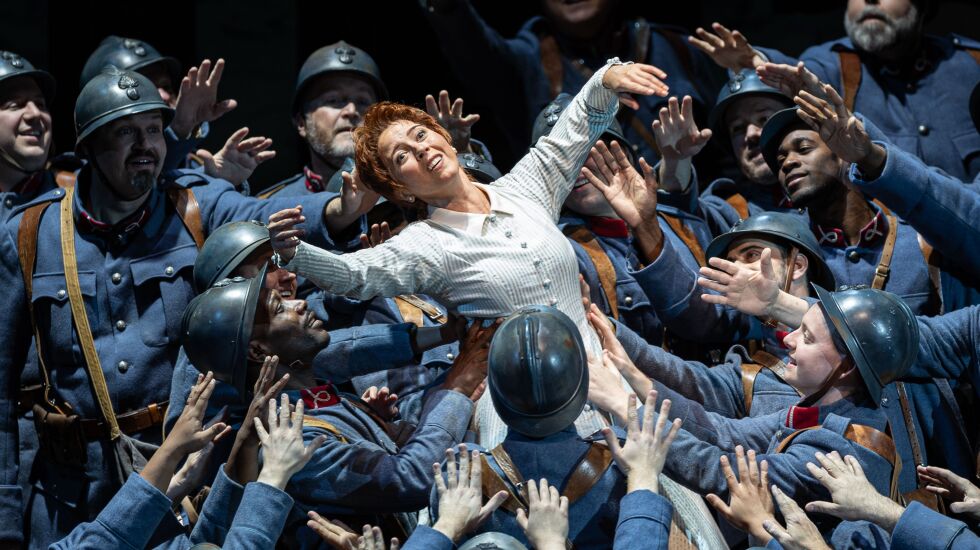
Given the breadth of the operatic repertoire, some major works inevitably fall through the cracks. But it’s still hard to believe that Lyric Opera of Chicago had only presented “The Daughter of the Regiment (La fille du régiment)” once in its history — a star-studded production that took place almost exactly 50 years ago.
To the good fortune of local opera lovers, the company has righted that wrong and done justice to this 1840 comic gem with a charming, effervescent and fun-filled production that opened Saturday evening at the Lyric Opera House.
Sure, the plot is a bit thin, but “Daughter of the Regiment” has all the necessary ingredients for a laugh-filled romp in the hands of the right director, which it has here. And Gaetano Donizetti, one of the masters of the Italian bel canto style in 18th and early 19th centuries, provides some of the most heartwarming and thrilling music of his career.
The French-language opera’s central comic gambit is simple and wonderfully absurd: A female foundling, Marie (soprano Lisette Oropesa), has been adopted and raised by an oafish yet lovable regiment of French soldiers. She irons and peels potatoes as she sings some of her most important arias.
Much to the chagrin of the regiment’s sergeant, Sulpice (baritone Alessandro Corbelli), Marie has fallen in love with a Tyrolean peasant, Tonio (tenor Lawrence Brownlee). And adding yet another layer to the merriment is the Act 1 revelation that she is actually of aristocratic lineage, and her supposed aunt, the Marquise de Berkenfield (mezzo-soprano Ronnita Miller), whisks her away to a very different and awkward lifestyle.
This presentation is a revival (directed by Christian Räth) of a co-production of the Royal Opera in London, Vienna State Opera and Metropolitan Opera in New York that was overseen by one the most talented and successful directors of our time, Laurent Pelly.
Rather than try to impose some kind of unnecessary, burdensome theatrical construct or concept onto this opera, Pelly has done what he always does so well, connect with the essence of this opera in an original, down-to-earth and delightfully entertaining way.
Nothing is ever static here. This production bustles with energy and movement (credit is also due to the original choreographer, Laura Scozzi), with, for example, the soldiers shuffling, clambering and marching to and fro and recoiling en masse and offering group double-takes to all that is happening.
Pelly has moved the action to apparently around the 1910s, a fanciful setting that does not seem all that important except it does allow him to bring onstage a realistically looking re-creation of a tank from that period in the production’s most flashy bit of stagecraft.
None of this would have mattered, of course, without the right cast, and Lyric Opera has assembled a dandy one. Mezzo-soprano Joy Hermalyn has little more than an Act 2 cameo as the Duchess of Crakentorp but she makes the most of it, drawing no shortage of laughs with her crass outbursts and self-aggrandizing body language.

A Lyric regular and understandably so, Corbelli is a superbly gifted comic actor who lights up the role of the lovable and grandiosely mustachioed Sulpice with his flawless French, boundless verve and burnished baritone voice.
Brownlee is particularly acclaimed as a bel canto interpreter, and it’s not hard to understand why. He shows an innate affinity for Donizetti’s vocal lines, investing his arias with compelling expressiveness and displaying dazzling technique as he hit every high note and garnered sustained ovations along the way Saturday evening.
The ultimate star of the show, though, is Oropesa, an American soprano who is making her Lyric debut. An innate physical comedian with a comfortable, compelling stage presence, she is a complete natural as Marie.
Oropesa has a supple, agile soprano voice, with a winningly honest and direct style. Seemingly unfazed by the vocal or physical demands of this role, this indefatigable singer handles its legendary coloratura with eye-opening ease and aplomb. Expect to see Oropesa back as soon as Lyric can re-sign her.
Also deserving praise is Lyric’s fine chorus, especially the several dozen or so men who portray the regiment. They deliver some fine singing but, just as important, adroitly handle the physical demands of Pelly’s exacting, non-stop staging.
Like Oropesa, conductor Speranza Scappucci is also making her Lyric debut, and she shows herself to be deft hand in the pit right from her eloquent shaping of the overture. She moves the action along in suitably spirited fashion and consistently brings out the best from the Lyric orchestra.







